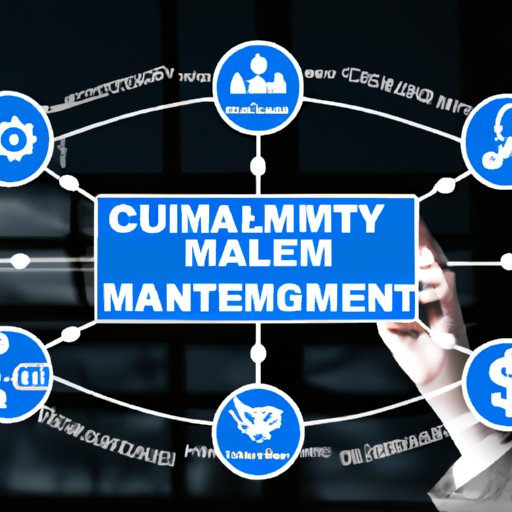Introduction
Supply chain management (SCM) is a critical component of any successful business. It involves overseeing and coordinating the entire process of getting goods from the manufacturer to the customer. SCM requires effective collaboration between multiple stakeholders, including suppliers, distributors, retailers, and customers. By managing the supply chain effectively, businesses can reduce costs, increase efficiency, and improve customer service.
Analyzing the Benefits of Supply Chain Management
There are several key benefits of effective SCM. Improved customer service is perhaps the most important benefit. By streamlining processes and optimizing inventory levels, businesses can ensure that products are available when customers need them. This helps to build customer loyalty and trust in the brand.
Efficiency is also improved through effective SCM. By automating processes such as ordering and delivery, businesses can reduce the amount of time and effort required to manage the supply chain. This can result in faster turnaround times and higher levels of efficiency.
Finally, SCM can help to reduce costs. By reducing waste and eliminating inefficiencies, businesses can save money on materials, labor, and other resources. This can have a significant impact on the bottom line.
Exploring the Impact of Globalization on Supply Chain Management
Globalization has had a major impact on SCM. With the expansion of markets, businesses now have access to a wider range of suppliers, distributors, and customers. This allows them to leverage resources in different countries and regions, giving them a competitive advantage.
In addition, increased competition has driven businesses to invest in more sophisticated SCM technologies. Companies must now focus on improving their supply chain performance in order to remain competitive in the global marketplace.

Examining the Role of Technology in Enhancing Supply Chain Efficiency
Technology is playing an increasingly important role in SCM. Automation of processes such as ordering, delivery, and inventory management can significantly reduce the amount of time and effort required to manage the supply chain. This can result in faster turnaround times and improved customer service.
In addition, improved communication and collaboration between stakeholders can help to optimize the supply chain. New technologies, such as cloud-based supply chain platforms, enable companies to share data and collaborate in real-time, helping to ensure that everyone is on the same page.
Finally, enhanced data analysis can help companies to identify weaknesses in the supply chain and make informed decisions about how to improve it. By tracking key metrics such as delivery times, inventory levels, and customer satisfaction, businesses can gain valuable insights into their supply chain performance.

Understanding the Challenges of Managing a Complex Supply Chain
Managing a complex supply chain is not without its challenges. Coordinating multiple stakeholders, ensuring quality control, and meeting customer expectations can all be difficult tasks. In addition, there are often competing interests between different stakeholders, which can make it difficult to achieve consensus.
It is also important to have a clear understanding of the regulations and laws that apply to the supply chain. Companies must ensure that they comply with these regulations, or they could face hefty fines and penalties.

Assessing the Cost Savings From Improved Supply Chain Management
Improved SCM can lead to significant cost savings. Streamlining processes, optimizing inventory levels, and improving visibility can all help to reduce costs. Investing in technology can also help to reduce manual labor costs and improve accuracy.
In addition, businesses can benefit from improved supplier relationships. By working closely with suppliers, businesses can negotiate better prices and secure more favorable payment terms. This can lead to significant savings over time.
Investigating the Role of Risk Management in Supply Chain Management
Risk management is an essential part of SCM. Companies must identify and evaluate potential risks, develop strategies to mitigate those risks, and implement processes to monitor and manage those risks. This is especially important in an increasingly globalized world, where companies are exposed to a wide range of risks.
For example, businesses must consider the political and economic risks associated with doing business in certain countries. They must also consider the potential risks posed by natural disasters, such as floods, earthquakes, and hurricanes. By developing a comprehensive risk management strategy, businesses can protect themselves from these potential risks.
Conclusion
Effective supply chain management is essential for any business. By managing the supply chain effectively, businesses can reduce costs, increase efficiency, and improve customer service. Globalization, technology, and risk management all play an important role in SCM. By understanding the benefits, challenges, and strategies for managing a complex supply chain, businesses can maximize cost savings and customer satisfaction.
(Note: Is this article not meeting your expectations? Do you have knowledge or insights to share? Unlock new opportunities and expand your reach by joining our authors team. Click Registration to join us and share your expertise with our readers.)
